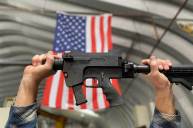In a six to three vote on Friday, the Supreme Court reversed the 2017 ban on bump stocks, a device designed to simulate automatic fire with a semi-automatic rifle. In the majority opinion, Justice Clarence Thomas found that the Trump administration had exceeded its powers by regulating the device as a machine gun. Obtaining an automatic weapon requires a background check, a lengthy processing period, and a $200 tax.
Former President Trump ordered the Bureau of Alcohol, Tobacco, Firearms, and Explosives (ATF) to impose the rule after a gunman used the device to open fire on a crowd at a Las Vegas concert. The October 2017 shooting killed 60 people and injured hundreds more. In the lawsuit, attorneys argued that the government forced their client, Michael Cargill, who owns a gun store in Austin, Texas, to surrender or destroy two bump stocks without changing federal law or offering compensation.
SCOTUS opinion and dissent
According to the decision, the basis of Thomas's argument is the technical definition of a machine gun. Under federal law, a machine gun is defined by mechanical components that allow it to cycle repeatedly by depressing a trigger. Whereas a bump stock causes repeated trigger pulls by bumping the rifle between a shooter's shoulder and trigger finger. Thomas described the ATF's argument as "a shooter using a bump stock must pull the trigger only one time to initiate a bump-firing sequence of multiple shots."
"This argument rests on the mistaken premise that there is a difference between the shooter flexing his finger to pull the trigger and pushing the firearm forward to bump the trigger against his stationary trigger," Thomas wrote. He called the ATF's argument "logically inconsistent" because it would also apply to a semi-auto rifle without a bump stock.
In a dissenting opinion, Justice Sonia Sotomayor described a bump stock as a device circumventing federal law. She explained that by reversing the ban, the high court seizes upon a definition that's inconsistent with the ordinary meaning of the law. "When I see a bird that walks like a duck, swims like a duck, and quacks like a duck, I call that bird a duck," she wrote. "A bump-stock-equipped semiautomatic rifle fires 'automatically more than one shot, without manual reloading, by a single function of the trigger.'"
Responses to SCOTUS reversing the bump stock ban
Following the decision, Steven Dettelbach, ATF's director, said "weapons equipped with bump stocks pose an unacceptable level of risk to public safety and referenced the 2017 shooting. He added that the ATF is "ready to work with Congress to ensure that these devices no longer pose a threat to American law enforcement and the people they protect."
In a press release, the New Civil Liberties Alliance, a conservative legal group that represented Cargill, called the decision "a major victory for the rule of law." The group said that the court agreed the National Firearms Act, the law that regulates machine guns, must be applied using the strict definitions written in the 1930s.
Mark Chenoweth, an NCLA attorney, said the decision "delighted" him. "This result is completely consistent with the Constitution's assignment of all legislative power to Congress. Bump-stock opponents should direct any views at Congress, not the Court, which faithfully applied the statute in front of it," he said.
The gun control group Everytown for Gun Safety seemed to agree with the premise that Congress should take action. John Feinblatt, the group's president, said in a statement that he urges "Congress to right this wrong and pass bipartisan legislation banning bump stocks, which are accessories of war that have no place in our communities."
Can you buy bump stocks now?
With the high court's decision, there's no longer a federal ban on bump stocks. However, some states still have laws prohibiting the device. Additionally, the federal rule required all bump stock owners to either surrender or destroy the item in 2019. Plus, the company that manufactured bump stocks, Slide Fire Solutions, shutdown production in 2018 and closed. So there's no inventory of bump stocks right now.
However, lawmakers are not done legislating bump stocks. Last year, lawmakers in both the House and Senate filed bills to permanently prohibit the device. Sen. Martin Heinrich, a Democrat from New Mexico, filed the bipartisan Banning Unlawful Machinegun Parts (BUMP) Act. And Rep. Dina Titus, a Democrat from Nevada, filed the Closing the Bump Stock Loophole Act. In a statement, Congresswoman Rosa DeLauro, a Democrat from Connecticut co-sponsoring the House bill, called the decision "outrageous, dangerous, and will have deadly consequences."
Article updated on June 17, 2024 at 9:30 a.m. Eastern




